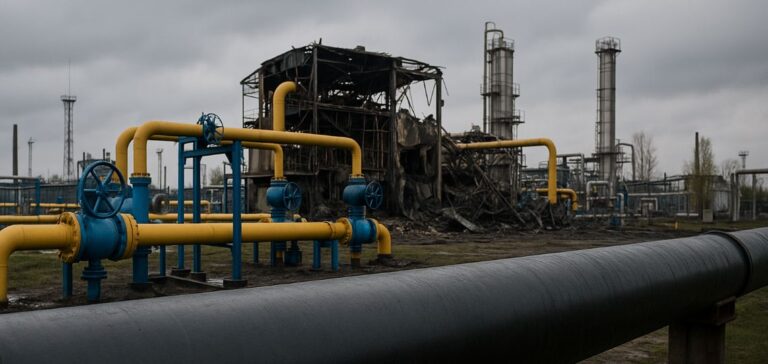Russian strikes targeting energy infrastructure have severely impacted Ukraine’s national gas production, said Prime Minister Denys Shmyhal, according to a statement released by his press service on April 29. Kyiv is now considering increasing imports to offset this loss.
Targeted attacks on gas infrastructure
Since the beginning of the military offensive launched in 2022, Russia has intensified strikes on energy infrastructure, primarily targeting electricity sites. According to Ukrainian media, last winter marked a shift in strategy, with attacks focusing on oil and gas production sites. Facilities located mainly in the Poltava and Kharkiv regions have been among the hardest hit.
Prime Minister Denys Shmyhal specified that the winter attacks “inflicted losses amounting to almost 50% of total production.” The reduction in production capacity now forces Ukraine to consider a greater reliance on gas imports to meet its energy needs ahead of the next winter.
Measures to boost national production
To address the energy crisis, the Ukrainian government plans to diversify supply sources and simplify procedures for private companies operating in the sector. This strategy aims to “accelerate” the recovery of domestic production, according to the Prime Minister.
Before these events, Ukrainian gas production had already suffered a 6% decline in 2022, the year the Russian invasion began. It recorded a slight recovery of 2% in 2024, reaching more than 19 billion cubic metres according to expert data cited by Ukrainian media.
Energy dependency at stake
For the first time in its history, Ukraine went through the 2024 winter relying solely on its own gas, according to the national company Naftogaz. Historically dependent on Russian gas, Ukraine has spent the past decade diversifying its suppliers and developing its national production.
By the end of March, Ukrainian media estimated that the country had lost nearly 40% of its gas production capacity and would be forced to import considerable volumes to ensure energy security for the next winter.






















